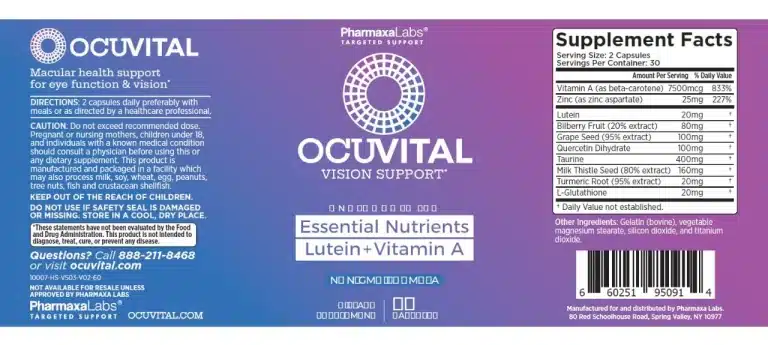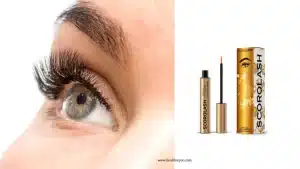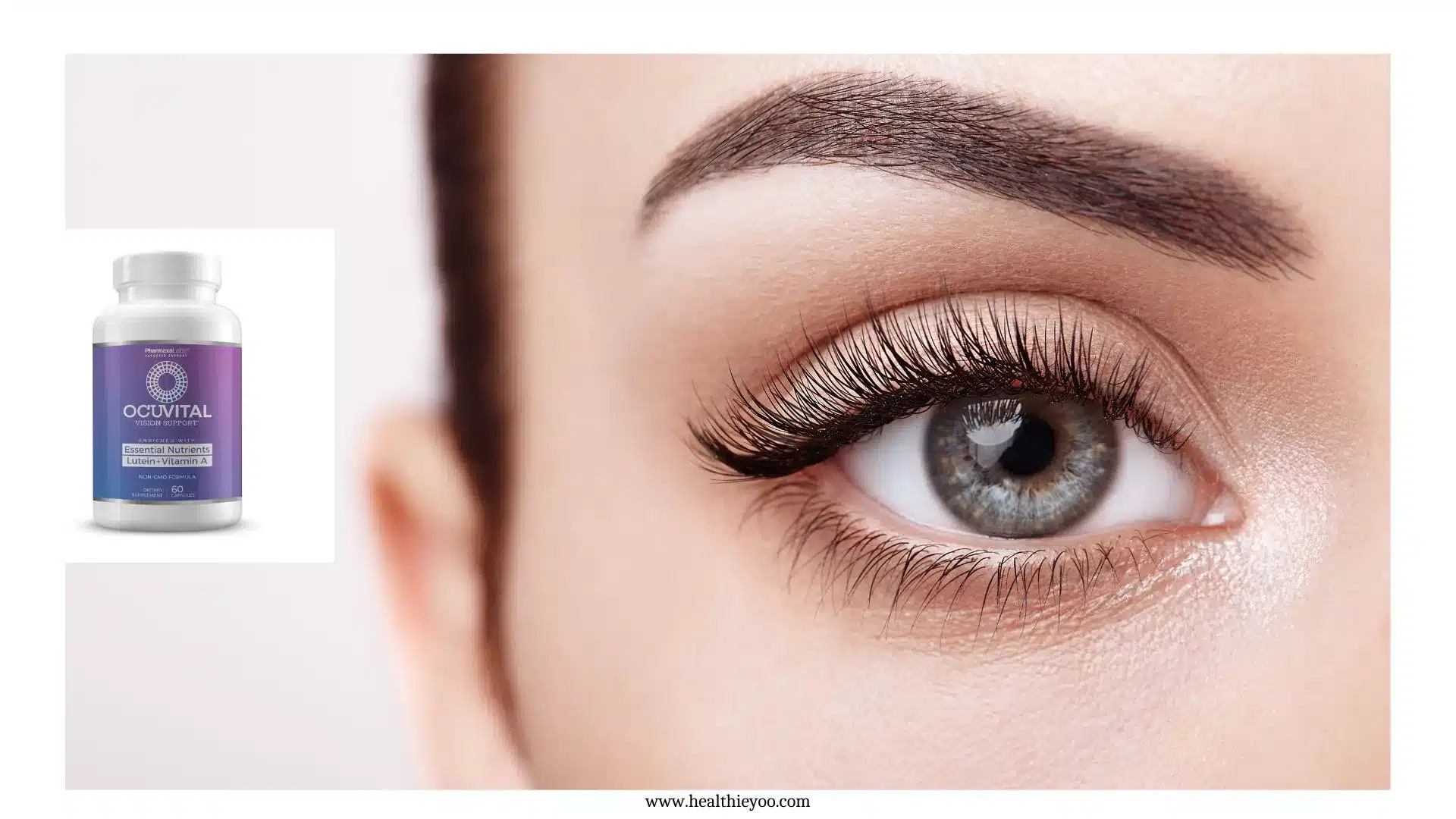Nutrition and diet can have long-term effects on the eye or ocular health. Nutrition plays an important role in maintaining eye health; nutritional interventions help prevent or treat ocular diseases. As you age, you become more prone to age-related eye diseases such as cataracts, glaucoma, or age-related macular degeneration (AMD) (1). Moreover, blue light exposure due to spending long hours in front of the computer screen, mobile phone, tablet, or TV screen, can increase your risk of developing vision problems and eye diseases. Hence, nutritional strategies are focused on slowing the disease progression in age-related and other eye problems. Ocuvital is one such strategy that is being reviewed here. So, here are the Ocuvital reviews of its ingredients. Also, check out Ocuvital benefits and possible risks or side effects and why it is considered as the nutrition for the eye.
Common Eye Diseases & Disorders
Before we read about ocuvital reviews, let us first understand the common conditions of the eye. As per the Centre for Disease Control and Prevention (CDC), common eye diseases and disorders include the following (2):
1. Refractive Errors
Refractive errors are the most common eye problems resulting in myopia (near-sightedness), hyperopia (farsightedness), astigmatism (distorted vision at all distances), and presbyopia (trouble seeing things up close with age). Most people suffer from refractive errors which can be due to changes in eyeball length, problems with the shape of the cornea, or aging of the lens.
2. Age-related Macular Degeneration (ARD)
Age-related macular degeneration (AMD) is the most common cause of loss of vision in the elderly and is responsible for 9% of cases of blindness worldwide (3). The disease affects the part of the eye called the macula which is located near the center of the retina at the back of the eye. The damage to the macula due to aging results in blurred central vision. Approximately 1.8 million Americans (> 40 years of age) are affected by AMD. Read in subsequent sections whether ocuvital reviews provide any evidence of its use in AMD.
3. Cataract
A cataract is the clouding of the natural lens of the eye that can lead to blurry vision or difficulty seeing under low light conditions. It is the leading cause of vision loss in the United States. It can occur at any age and there are treatments available to remove cataracts surgically. An estimated 20.5 million Americans develop cataracts in either one or both eyes.
4. Diabetic Retinopathy
Diabetic retinopathy is one of the complications of diabetes mellitus due to long-term high blood sugar and HbA1c levels. It is caused by damage to the blood vessels in the retina of the eye by high sugar (glucose) levels. Symptoms of diabetic retinopathy include blurred vision and floaters. Controlling blood sugar levels help prevent diabetic retinopathy.
5. Glaucoma
Glaucoma occurs due to damage to the eye’s optic nerve and can result in blindness. The optic nerve is responsible for the transmission of visual information from the eye to the brain. Damage to the optic nerve is due to increased pressure within the eyes, called intraocular pressure.
There are two main types of glaucoma:
Open-angle glaucoma
It is the most common type and develops gradually.
Closed-angle glaucoma
It develops suddenly and is considered a medical emergency.
6. Amblyopia
Amblyopia, called lazy eye, is a common cause of impaired vision in children. In this condition, the brain and the eye do not work together leading to reduced vision in one of the eyes.
7. Strabismus
Strabismus is a condition involving an imbalance in the positioning of the two eyes. It can cause Amblyopia in children.
8. Keratoconus
Keratoconus is a disease of the cornea that leads to impairment of vision. In this condition, the cornea gradually thins over time and protrudes out. There is corneal edema, scarring, and vision loss. In advanced stages, corneal transplantation is required.
9. Conjunctivitis
Conjunctivitis is the inflammation of the conjunctiva of the eye. As the conjunctiva is often in contact with the allergens like pollen, dust, etc., it gets infected by bacteria easily. Anti-inflammatory treatments are generally used in the case of conjunctivitis.
Ocuvital Ingredients
As per the official label, Ocuvital contains the following ingredients:
S. No. | Ingredients | Amount per Serving |
1. | Beta Carotene (Vitamin A) | 7500mcg |
2. | Zinc Aspartate (Zinc) | 25mg |
3. | Lutein | 20mg |
4. | Bilberry Fruit (20% extract) | 80mg |
5. | Grape Seed (95% extract) | 100mg |
6. | Quercetin Dihydrate | 100mg |
7. | Taurine | 400mg |
8. | Milk Thistle Seed (80% extract) | 160mg |
9. | Turmeric Root (95% extract) | 20mg |
10. | L-Glutathione | 20mg |
Ocuvital Reviews: Do Ocuvital Ingredients Support Eye Health?
Here are the ocuvital reviews of its ingredients based on our scientific literature review:

Beta Carotene (Vitamin A)
We all know that vitamin A is essential for good vision, and its deficiency can affect your eyesight or can lead to vision problems. Good food sources of vitamin A include carrots, sweet potatoes, leafy greens, etc. Beta-carotene is a carotenoid, a pigment found in several fruits and vegetables which gets converted in the body to vitamin A. All the brightly colored fruits such as strawberries, papaya, apricot, and vegetables like carrots, spinach, kale, sweet potatoes, etc. contain beta carotene. Studies suggest that beta-carotene also possesses antioxidant and anti-inflammatory potential.
The Age-Related Eye Disease Study (AREDS) includes major clinical trials sponsored by the National Eye Institute (4) of the National Institute of Health (NIH). In an AREDS study, it was suggested that supplementation with vitamins C, E, beta carotene, and zinc at doses above the recommended daily allowances reduced the risk of developing advanced AMD in persons older than 55 years of age (5). Ocuvital contains both beta carotene and zinc and hence might be beneficial in preventing AMD. Oxidative damage to the retina might be involved in AMD progression while beta carotene possesses antioxidant potential.
It is, however, pertinent to mention here that high doses of beta-carotene supplements can be harmful, particularly for smokers. Our review of the literature regarding two AREDS clinical trials provided information that 2% of smokers who took high doses of AREDS formulation containing beta carotene, developed lung cancer as compared to AREDS formula without beta carotene. AREDS formula contains 15mg beta carotene while Ocuvital contains 7500 mcg which is equal to 7.5mg of beta carotene. Hence, ocuvital reviews suggest that smokers should avoid Ocuvital. It is best to consult your primary care physician or eye care provider on how to protect your eye health. In fact, the Ocuvital label suggests not exceeding the recommended dosages.
Zinc Aspartate (Zinc)
Studies have shown that zinc supplementation can slow the progression of AMD in some people, particularly when combined with other nutrients such as vitamins C and E and beta-carotene. This was demonstrated in the AREDS study too.
However, it is important to note that taking too much zinc can cause nausea, vomiting, and diarrhea. Long-term use of high-dose zinc supplements can also lead to low levels of good (HDL) cholesterol, and copper deficiency, which can cause anemia and other health problems. In addition, too much zinc can reduce the body’s absorption of magnesium (7). The daily upper limit of zinc in adults is 40mg. Reviews on the Ocuvital label suggested that it contains 25mg of zinc. It is important to talk to your doctor before taking any zinc supplements, particularly if you are taking other medications or have any underlying health conditions.
Lutein
Lutein is a carotenoid that is present in the macula of the human retina. It cannot be synthesized by the body and must be obtained from the diet. Lutein is found in green leafy vegetables such as kale, spinach, broccoli, and egg yolk, and in orange-yellow fruits and vegetables. Studies have suggested the beneficial role of Lutein in several conditions of the eye due to its effects in alleviating oxidative and inflammatory damage of the eye. Further, due to the blue light filtering effect, it can help protect the eyes from the damage caused by the blue light. Hence, Lutein was found to have a beneficial role in several conditions of the eye including reducing progression to AMD and diabetic retinopathy, myopia, cataract, etc. (8). Lutein present in Ocuvital is considered safe for long-term use and is generally regarded as safe (GRAS) by the United States Food and Drug Administration (FDA).
Bilberry Fruit Extract
Bilberry (Vaccinium myrtillus L.) fruit extracts are a part of eye health-promoting supplements, whereas leaf extracts are used for type 2 diabetes mellitus. Bilberry fruit extract contains Lutein which improves eye health. Anthocyanins present in the extract improve night vision. Clinical trials demonstrate the effect of Bilberry fruit extract to improve the state of retinal blood vessels in diabetic retinopathy. Further, a few studies show that Bilberry fruit extract can reduce intraocular pressure in patients (9). Additionally, the extract possesses antioxidant and anti-inflammatory activities. Recently, a study showed that dietary supplementation of Bilberry extract and Fish oil for 3 months improved signs and symptoms of severe dry eyes (10).
Grape Seed Extract
The Grape seed extract is a dietary supplement that is widely consumed supplement used to scavenge free radicals. It helps inhibit cataract formation (11). There is evidence to suggest that grape seed extract help reduce floaters in cataract. Grape seed extract contains a high concentration of antioxidants, including proanthocyanidins. Ocuvital contains grape seed extract and our reviews suggested that the grape seed extract, being a blood thinner can interact with other blood thinner medications such as warfarin, clopidogrel, etc, and can increase the risk of bleeding.
Quercetin Dihydrate
Quercetin is one of the most abundant flavonol present in a variety of fruits and vegetables with strong antioxidant and anti-inflammatory potential. It has been used in several eye supplements with evidence of its beneficial effects in several ophthalmological conditions such as keratoconus, conjunctivitis, cataract, dry eyes, retinopathy, and several other conditions. Quercetin antioxidant activity is used for keratoconus and anti-inflammatory activity is utilized in conjunctivitis (12). However, despite the potential of quercetin in experimental studies, there are not enough human clinical trials on quercetin. With respect to safety, quercetin is not recommended for kidney patients and in cancer and terminally ill patients (13). Again, the data on human trials is limited.
Taurine
Taurine is an amino acid that is abundantly present in the retina of the eye. Though Taurine is considered a non-essential amino acid, it has found applications in eye diseases. It has been shown by researchers that Taurine can prevent retinal degeneration by reducing oxidative stress in the retina. It can also prevent or reduce damage to the optic nerve (14). Additionally, some evidence suggests that Taurine has found usefulness in delaying cataract formation. It was observed by researchers that there is a loss of the antioxidant glutathione in age-related cataracts in the center of the lens. Taurine acts as an important antioxidant in lens tissue thereby preventing or delaying the formation of cataracts (15).
Milk Thistle Seed Extract
Milk Thistle is referred to the herb Silybum marianum which is a native plant in the Mediterranean region, Europe, and Asia. The milk thistle extract made from the seeds contains 4-6% Silymarin. The extract contains both silymarin and linoleic acid. There are not many medicinal uses of the plant. Further, milk thistle-based supplements have been reported to have higher mycotoxin concentrations than other plant-based supplements (16).
Silibinin is an active constituent isolated from milk thistle and has been studied for its liver protection and anticancer activity. Silibinin treatment was shown experimentally to prevent age-related macular degeneration (AMD) (17).
Turmeric Root Extract
Turmeric is a root obtained from the plant Curcuma longa. Curcumin is an active component of turmeric and is commonly used as a spice in Indian cooking. Curcumin has strong antioxidant and anti-inflammatory activities that are well-established in experimental studies and human clinical trials. Apart from its several beneficial effects, turmeric root extract plays an important role in preventing several eye diseases including glaucoma, cataract, AMD, diabetic retinopathy, dry eye disease, conjunctivitis, and others (18). Thus, curcumin present in turmeric root extract may exert beneficial effects in Ocuvital for several conditions of the eye. Turmeric has been utilized in cooking for thousands of years and is considered to be safe.
L-Glutathione
Ocuvital Benefits
Ocuvital reviews of its ingredients suggest that evidence indeed exists for the beneficial effects of Ocuvital ingredients in several eye conditions. On the basis of available studies, it can be summarised that ocuvital contains ingredients that might have the following role:
- Prevent or slow the progression of Age-related Macular Degeneration (AMD)
- Help protect the eyes from damage caused by blue light.
- Help alleviate oxidative and inflammatory damage to the eye
- Improve the state of blood vessels and protect diabetics against diabetic retinopathy.
- Improve signs and symptoms of dry eyes.
- Reduce floaters in cataract and might delay cataract formation.
- Benefit keratoconus, the disease of the cornea
- Reduce inflammation in conjunctivitis and optic neuropathies.
- Improve night vision.
- Support overall eye health
Ocuvital Side Effects
Ocuvital reviews of its ingredients and side effects suggest that Ocuvital is not advisable for smokers and people suffering from kidney or heart-related issues or any other severe health condition (please see ingredients for more details). Ocuvital is not recommended in pregnancy and lactation and children below 18 years of age. If you are taking concomitant medications, it is best to consult your physician for any possible interactions.
Who manufactures Ocuvital?
Where to obtain Ocuvital? Ocuvital is a dietary supplement for the eye, which is manufactured by Pharmaxa Laboratories, a leading manufacturer of quality health products for more than 20 years. We recommend purchasing Ocuvital from its official website (20). Moreover, the official website offers a 100% money-back guarantee within 60 days of purchase if you are not satisfied with the product. The manufacturer recommends taking 2 capsules daily preferably with meals.
Ocuvital: The Final Words
Ocuvital is a comprehensive dietary supplement designed to support eye health. Ocuvital contains 10 ingredients which are carefully selected based on reviews and evidence to support eye health and to prevent several eye-related conditions such as age-related macular degeneration, diabetic retinopathy, and cataract formation. In addition, Ocuvital ingredients may have beneficial effects in persons with keratoconus, and glaucoma, help with dry eyes and reduce inflammation when one is suffering from conjunctivitis, optic neuropathies, etc. The multiple benefits suggest that Ocuvital is indeed a nutrition for the eye.
As the number of people spending prolonged hours in front of screens increases their exposure to harmful blue light, there is a mounting awareness and concern about the rise in the number of people experiencing various eye-related issues and increased incidence of eye diseases. This highlights the importance of taking proactive measures to support and maintain healthy eyes. Ocuvital, as a comprehensive dietary supplement, offers a valuable solution for individuals seeking to address these concerns and promote optimal eye health.
However, the Ocuvital reviews of the above ingredients do not constitute medical advice, and it is always best to review the risk-benefit ratio and consult your eye care physician or ophthalmologist before starting any dietary supplement for the eye.
Disclosure – This is a sponsored post and we have received compensation for publishing it. The products belong to a third party, and we have neither used nor endorsed any products. Our in-house writers have often written, and reviewed content based on trustworthy scientific literature or as the manufacturer claimed on their website. Here we would like to disclose that it is not possible to refer to all the studies or scientific literature available in the public domain. Hence, we disclaim any and all liability to any party, company, or product for any direct, indirect, implied, punitive, special, incidental, or consequential damages arising either directly or indirectly due to the use of content published in this article. Please also read our medical disclaimer.
Sources
- https://www.ncbi.nlm.nih.gov/pmc/articles/PMC3693724/
- https://www.cdc.gov/visionhealth/basics/ced/index.html
- https://www.ncbi.nlm.nih.gov/pmc/articles/PMC7588619/
- https://www.nei.nih.gov/research/clinical-trials/age-related-eye-disease-studies-aredsareds2
- https://pubmed.ncbi.nlm.nih.gov/11594942/
- https://eyewiki.aao.org/Zinc_Optic_Neuropathy
- https://ods.od.nih.gov/factsheets/Zinc-Consumer
- https://pubmed.ncbi.nlm.nih.gov/32526861
- https://www.ncbi.nlm.nih.gov/pmc/articles/PMC9277355/
- https://www.ncbi.nlm.nih.gov/pmc/articles/PMC9892183/
- https://www.ncbi.nlm.nih.gov/pmc/articles/PMC3025097/
- https://pubmed.ncbi.nlm.nih.gov/33561647/
- https://pubmed.ncbi.nlm.nih.gov/29127724/
- https://www.ncbi.nlm.nih.gov/pmc/articles/PMC6183037/
- https://www.europeanreview.org/article/26244
- https://en.wikipedia.org/wiki/Silybum_marianum
- https://www.ncbi.nlm.nih.gov/pmc/articles/PMC3631380/
- https://www.ncbi.nlm.nih.gov/pmc/articles/PMC6745545/
- https://pubmed.ncbi.nlm.nih.gov/33923192/
- https://www.ocuvital.com/
Related Posts

Scorolash Reviews – Is the Eyelash Growth Serum Worth the Hype?

Nutrition and Eye Health: Key Nutrients for Maintaining Good Vision

MCT Wellness Reviews, Ingredients, Side Effects – Is Dr. Gundry MCT Wellness a Hoax?


K3 Spark Mineral Reviews, Ingredients, Benefits, Risks of Mystery Pills & Gummies for Weight loss




